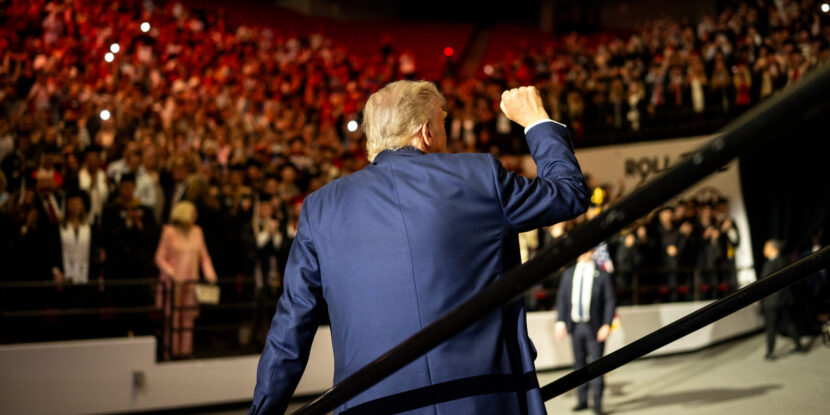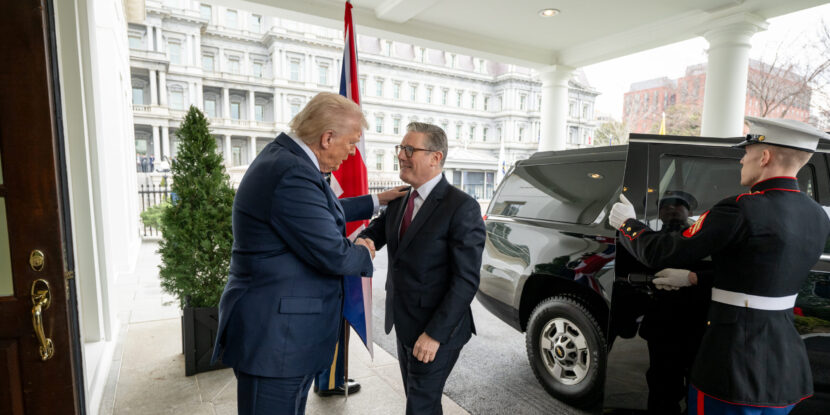
PULSE POINTS:
❓What Happened: President Donald J. Trump announced a new trade agreement with the United Kingdom, leading to a rise in U.S. stock markets.
👥 Who’s Involved: President Donald J. Trump, Commerce Secretary Howard Lutnick, Treasury Secretary Scott Bessent, investors, and the U.S. Stock Market.
Your free, daily feed from The National Pulse.
📍 Where & When: The announcement of the U.S.-UK trade deal was made on Thursday morning, May 8, 2025, from the Oval Office.
💬 Key Quote: Trump stated the deal will provide “billions of dollars of increased market access for American exports, especially in agriculture.”
⚠️ Impact: U.S. stock indices rose, with the S&P 500, Dow Jones, and Nasdaq all gaining. The blue-chip Dow narrowly missed exit correction territory.
IN FULL:
U.S. stock markets experienced a boost on Thursday following President Donald J. Trump’s announcement of a trade agreement with the United Kingdom. At closing, the Dow Jones had gained 254 points, or 0.6 percent. Meanwhile, the S&P 500 also rose 0.6 percent, and the Nasdaq closed up 1 percent.
After weeks of what Trump critics tried to frame as a market decline, the blue-chip Dow Jones narrowly missed exit correction territory, strongly suggesting that the volatility has been driven by a much-needed market correction. Notably, the market gains are also throwing cold water on fears that the United States has entered a bear market.
In a statement from the Oval Office, President Trump highlighted the economic benefits of the new trade deal, which promises “billions of dollars of increased market access for American exports, especially in agriculture.” He noted that the United Kingdom will remove non-tariff barriers that have previously “unfairly discriminated against American products.”
Despite the new agreement, lower tariffs on imports from Britain will remain. Commerce Secretary Howard Lutnick confirmed that tariffs would continue to generate $6 billion in revenue for the United States.
Treasury Secretary Scott Bessent informed a House committee earlier this week that the U.S. is engaged in negotiations with 17 out of 18 key trading partners. While the U.S.-U.K. deal is seen as a positive step, larger traders like China may present more significant challenges. China has reiterated its demand for the U.S. to cancel tariffs, a point of contention ahead of talks between Secretary Bessent and a Chinese delegation this weekend.
President Trump has maintained his stance on not reducing the 145 percent tariffs on Chinese goods during negotiations. Meanwhile, the Federal Reserve, citing trade policy uncertainties, decided to keep its benchmark interest rate steady at 4.25 percent to 4.5 percent.

PULSE POINTS:
❓What Happened: A bilateral trade deal between the United States and the United Kingdom was signed on Thursday, May 8, 2025.
👥 Who’s Involved: President Donald J. Trump and Prime Minister Sir Keir Starmer.
Your free, daily feed from The National Pulse.
📍 Where & When: Announcement from the Oval Office on Thursday.
💬 Key Quote: “Both countries agree that economic security is national security,” said President Trump, noting that the deal will “bring the United Kingdom into economic security alignment with the United States.”
⚠️ Impact: The deal is seen as a significant move following President Trump’s ‘Liberation Day’ tariffs in the U.S. and Brexit in the United Kingdom, with potential implications for UK-EU relations.
IN FULL:
The United States and the United Kingdom signed a significant trade agreement on Thursday, the first bilateral deal since President Donald J. Trump imposed tariffs on foreign goods in April. Before the signing, President Trump alluded to the agreement, saying the White House would be making a “major” announcement that would be “very big and exciting” for both the U.S. and the UK.
President Trump said the deal will eliminate many tariff and non-tariff barriers to American goods entering the British market, and vice versa, “bring[ing] the United Kingdom into economic security alignment with the United States.” The America First leader’s words suggest his administration is looking to create something of an economic bloc on the world stage, comprised of like-minded allies, as opposed to a system of general free trade, including countries like Communist China, which is notorious for underhanded commercial practices such as currency manipulation and industrial espionage.
Prime Minister Sir Keir Starmer said it was “a really fantastic, historic day,” paying tribute to President Trump and his negotiating team and noting the symbolism of the deal being signed of Victory in Europe (VE) Day, when the United States, the British Empire, and other allies declared victory over Nazi Germany.
Notably, the trade agreement is only possible because of the United Kingdom’s Brexit vote and subsequent departure from the European Union (EU). This move has given British leaders greater maneuverability on the international stage, with the EU controlling trade policy for all of its member states and barring them from making their own bilateral deals.
The British-American agreement is a critical step for both nations, as the two countries are each other’s largest source of foreign direct investment. Additionally, the U.S. is the top export market for British goods, and the UK is the seventh-largest export destination for U.S. exports—with commerce likely to be further uplifted by the new trade agreement.
Last month, U.S. Vice President J.D. Vance signalled that a trade deal with the United Kingdom was a priority for the Trump White House. The Vice President stated: “There’s a real cultural affinity. And of course, fundamentally, America is an Anglo country. I think there’s a good chance that, yes, we’ll come to a great agreement that’s in the best interest of both countries.”
President Trump is set to visit the United Kingdom in September for a second state visit. It is widely expected that the British-American trade deal will serve as a catalyst for other nations to expedite their negotiations with the U.S. and pressure the EU to make concessions, so its former member state does not gain too much of a competitive advantage.
WATCH:
🚨 @POTUS: “This morning, I’m thrilled to announce that we have reached a breakthrough trade deal with the United Kingdom… it’s really in particular, the agreement with one of our closest and most cherished allies and we’re so happy that that’s the way it worked out.” pic.twitter.com/pKJjn2fNls
— Rapid Response 47 (@RapidResponse47) May 8, 2025
Jack Montgomery contributed to this report.
This story is developing…
show less

 1 month ago
3
1 month ago
3








 English (US) ·
English (US) ·